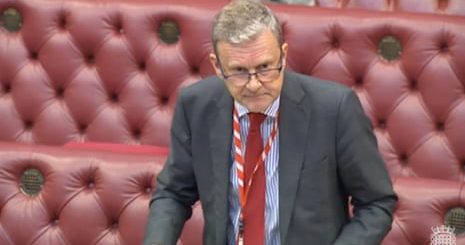Boris Johnson ‘clearly bamboozled’ and ‘confused’ about science, Patrick Vallance notes reveal – UK Covid inquiry live | Politics
Vallance’s diary provides Covid inquiry with multiple examples of Boris Johnson struggling to understand scientific advice
O’Connor asks about Boris Johnson’s understanding of scientific concepts. He shows the inquiry a series of extracts from Vallance’s diary which provide evidence of this.
This extract, from May 2020, describes Johnson as being “clearly bamboozled” by modelling on schools.
Here is another extract from May 2020 describing Johnson as being “confused” about different types of tests.
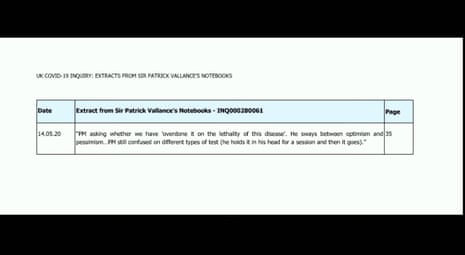
In this extract, from June 2020, Vallance says it is “awful” watching Johnson trying to understand statistics and that he finds the difference between absolute and relative risk “almost impossible to understand”.
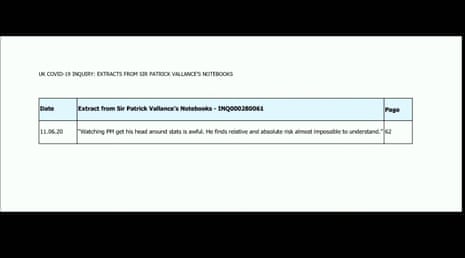
In this extract, from July 2020, Vallance says Johnson did not understand the concept of doubling times.
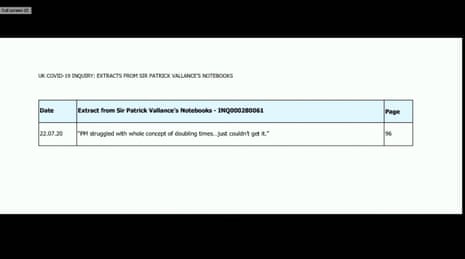
And this one, from September 2020, says it is difficult getting Johnson to understand graphs – even when he has seen them before.
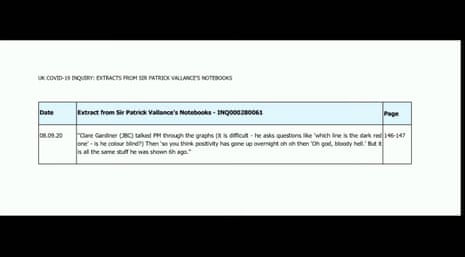
Key events
Vallance rejects suggestions Sage should have included economists, but says separate ‘economic Sage’ could be helpful
The Covid inquiry’s afternoon session has started. Andrew O’Connor, counsel for the inquiry, is asking about suggestions that there should have been an economic version of Sage (the Scientific Advisory Group for Emergencies) to conduct economic modelling.
Sir Patrick Vallance, the government’s former chief scientific adviser, says he thinks there should be an academic centre for pandemic preparedness in the UK. It should be very multi-disciplinary, he says. It should include economists, who could model the economic impact of interventions like lockdowns, he says.
But he says he would not be in favour of getting Sage to do economic modelling itself. He says that would lead to it having to take decisions, balancing health and economics, which involved trade-offs which should be determined by ministers. And, given the uncertainties in pandemic modelling and economic modelling, what would come out would be “one almighty uncertainty”.
But he says he would be in favour of having a standalone “economic Sage”, providing advice on the economic impact of pandemic measures. He says he would be in favour of that, if the Treasury wanted it.
In the morning session the Covid inquiry was also shown an entry from Sir Patrick Vallance’s diary for 20 September 2020 in which he records Boris Johnson complaining about people wearing masks and speculating about people (Britons? human beings? – it is not clear) being “too shit to get our act together”.
It says:
5 hr of meetings with the PM. He came back from Battle of Britain memorial service and was distressed by seeing everyone separated and in masks – ‘mad and spooky, we have got to end it’. Starts challenging numbers and questioning whether they really translate into deaths. Says it is not exponential etc etc. Looked broken – head in hands a lot. ‘Is it because of the great libertarian nation we are that it spreads so much?’ ‘Maybe we are licked as a species’… ‘We are too shit to get our act together.’ We went round in circles and then the famous whiteboard emerges. Discussed Package A (mild (increase) measures) and Package C (full lockdown) and when and how to do a circuit breaker… eventually sort of agree circuit breaker and stricter measures… but PM keeps clutching at straws.
Boris Johnson in Sept 2020, being v gloomy: “Maybe we are licked as species… We’re too shit to get our act together.”
Patrick Vallance says, with understatement, offering scientific advice to Johnson was “difficult at times”. pic.twitter.com/dCxXlHeGcX
— Peter Walker (@peterwalker99) November 20, 2023
Sunak says he will cut taxes ‘over time’ as he announces new economic priorities
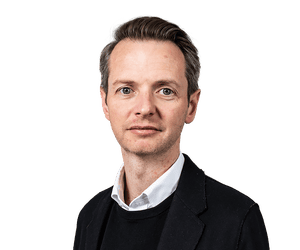
Ben Quinn
Rishi Sunak has pledged to cut taxes “over time” in a speech that risks incurring the wrath of Conservative MPs impatient to see personal tax cuts announced as early as this week.
However, the prime minister’s announcement of what are intended to be five new key economics priorities almost went unnoticed at an event that was overshadowed by questions about the scale and type of tax cuts the chancellor, Jeremy Hunt, may make in Wednesday’s autumn statement.
Britain faced a choice between a “big government” of high spending and taxes, which Sunak said was necessary in recent years, and a change in approach which would see an attempt to grow the economy through the “dynamism” of the private sector.
Now that inflation had been halved, he said, the government would take long-term decisions as part of the “next phase” of the government’s economic plan following a fall in inflation to 4.6% in October.
He listed them as reducing debt, cutting tax and rewarding hard work, building domestic and sustainable energy, backing British business and delivery world class education.
The priorities went largely unnoticed by the media until journalists approached Downing Street afterwards and were told that they were intended to be a significant moment.
They do not replace Sunak’s “five priorities” – ranging from halving inflation to “stopping the boats” – but were outlined in a speech at a north London college where the Conservative leader previewed the ways in which he is likely to differentiate his party from Labour in an election campaign.
As Hunt and a range of other ministers listened in the front row, Sunak used the speech to hint at business tax cuts to boost economic growth, promising to reduce the tax burden “carefully and sustainably”.
Sunak said:
Now that inflation is halved and our growth is stronger, meaning revenues are higher we can begin the next phase, and turn our attention to cutting tax.
We will do this in a serious, responsible way based on fiscal rules to deliver sound money and alongside the independent forecasts of the Office for Budget Responsibility.
And we can’t do everything all at once. It will take discipline and we need to prioritise. But over time, we can and we will cut taxes.
After the speech to an audience of local business and community leaders, Sunak claimed that the welfare system is not currently “sustainable” when asked about a possible squeeze on welfare payments in the autumn statement.
Declining to “pre-empt” any announcements on Wednesday, the PM said:
Our view on the welfare system is that it should be compassionate, it should be fair and it should be sustainable …
With over 2 million people of working age who are not currently working, that isn’t a good situation. It’s not sustainable for the country, for taxpayers. It’s not fair. But it’s also not compassionate to write people off.
In other section of his speech, Sunak sought to portray Labour as being in the pockets of trade unions and attempted to contrast his own and Hunt’s experience of being in business to his opponents, who he said “have no experience whatsoever over running a business”.
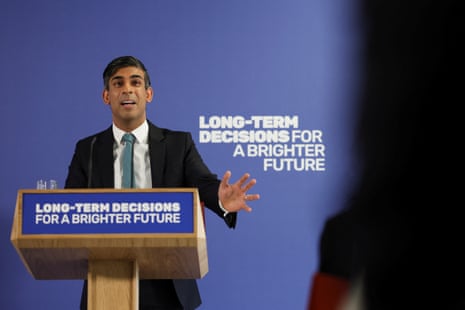
Vallance says he’s surprised by Sunak telling Covid inquiry he can’t recall scientists having concerns about eat out to help out
Just before the hearing broke for lunch Andrew O’Connor, counsel for the inquiry, asked about eat out to help out (EOTHO) – the Treasury subsidy for restaurants in the summer of 2020, which was subsequently blamed for helping to spread the virus.
Patrick Vallance, the government’s chief scientific adviser at the time, said that he and other scientists were not asked about it in advance. If they had been, they would have advised against, he said. “I think our advice would have been very clear on that.”
O’Connor presented an extract from Vallance’s witness statement in which he says it would have been “obvious to all involved” that scientists would have said, if they had been asked, that the scheme would increase infections.

O’Connor then presented an extract from Rishi Sunak’s witness statement, in which he claims that government scientists did not raise any objections with him to the EOTHO scheme.
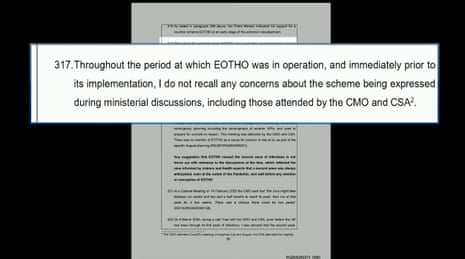
O’Connor put it to Vallance that there was “a certain inconsistency” between Vallance saying it was obvious that scientists would not have backed the scheme, and Sunak saying no one raised objections.
Vallance replied:
Well, we didn’t see it before it was announced and I think others in the Cabinet Office have also said they didn’t see it before it was formulated as a policy. So we weren’t involved in the run-up to it.
And around that time lots of measures were being released. You’ll see repeated references in various minutes and notes and emails, and in my private notes, to our concern that people were piling on more and more things and this would come to drive R (the reproduction number) above one. I think that was discussed at cabinet as well.
So I think it would have been very obvious to anyone that this was likely to cause, inevitably would cause, an increase in transmission risk. And I think that would have been known by ministers.
O’Connor asked if Sunak would have known this too.
Vallance said he could not recall which meetings Sunak attended. But he went on:
I’d be very surprised if any minister didn’t understand that these openings carried risk.
Vallance recorded in his diary how No 10 wanted science ‘altered’, inquiry hears
O’Connor then presented extracts from Vallance’s diary in which he describes ministers trying to sideline the scientists.
In this extract, from June 2020, he says No 10 did not understand the 2- metre rule.
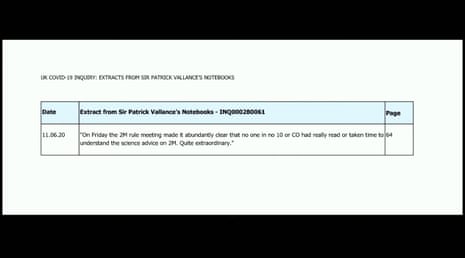
In this extract, also from June 2020, Vallance recalls an issue where he says No 10 wanted the science “altered”.
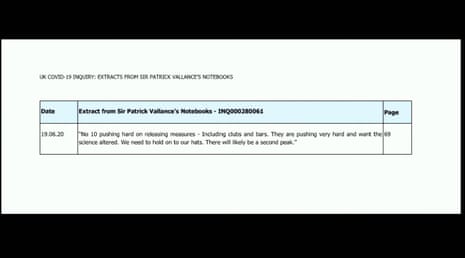
And in this extract, from July 2020, Vallance recalls Rishi Sunak, the then chancellor, talking in a meeting about the need to manage the scientists, not the virus. Sunak did not realise Chris Whitty was in the meeting too. Vallance says:
In the economics meeting earlier today they didn’t realise CMO (chief medical officer Sir Chris Whitty) was there and CX (then-chancellor Rishi Sunak) said ‘It is all about handling the scientists, not handling the virus’. They then got flustered when the CMO chipped in later and they realised he had been there all along. PM blustered and waffled for five mins to cover his embarrassment.

Asked about these interventions, Vallance played down the significance of them, suggesting that that was just what politicians did. He says generally the scientists were listened to.
UPDATE: Vallance said:
I think there were definitely periods when it was clear that the unwelcome advice we were giving was, as expected, not loved.
And that meant we had to work doubly hard to make sure that the science evidence and advice was being properly heard.
Now, it doesn’t surprise me that there were meetings that we were not included in, that’s normal.
We were, as I said, in No 10 probably for 45 minutes or an hour, and there were things going on all day, and political decisions as well, so it’s not surprising that we were not invited to things sometimes.
Vallance told the inquiry he favoured publishing the Sage minutes. O’Connor presented him with evidence from his diary showing that, when the Cabinet Office realised minutes were being published, it stopped posing questions to Sage for discussions at meetings because it did not want the public to know those options were being considered. Vallance said he favoured openness.
Johnson provoked ‘incredulity’ at meeting as he commented on what Covid graphs might mean, inquiry hears
O’Connor then showed some more extract from Vallance’s diary about Johnson.
In this one, from February 2021, Vallance says it was a “real struggle” to get Johnson to understand graphs from the Covid dashboard.

And in this extract, from September 2020, Vallance records “incredulity” in the room as Johnson described the graphs as a “mirage” in a meeting.
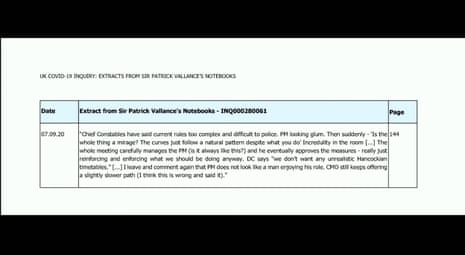
Vallance says it is ‘not unusual’ for leaders in western democracies to have poor understanding of science
Vallance told the inquiry that Boris Johnson gave up studying science at the age of 15. He said Johnson would be the first to admit that science wasn’t his strong point.
But he said it is not unusual for politicians to have a poor grasp of science. He recalled a conversation with fellow scientists from other countries where one of them spoke about how hard it was to get their minister to understand exponential curves. They all laughed, because they had all had the same experience, he said.
Vallance said he thought Johnson may have deliberately pretended to misunderstand things, just as a means of checking his comprehension.
But he also said a poor understanding of science was “not unusual amongst leaders in western democracies”.
Vallance’s diary provides Covid inquiry with multiple examples of Boris Johnson struggling to understand scientific advice
O’Connor asks about Boris Johnson’s understanding of scientific concepts. He shows the inquiry a series of extracts from Vallance’s diary which provide evidence of this.
This extract, from May 2020, describes Johnson as being “clearly bamboozled” by modelling on schools.
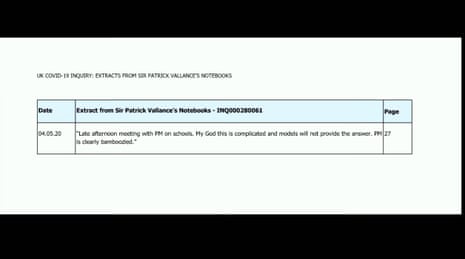
Here is another extract from May 2020 describing Johnson as being “confused” about different types of tests.

In this extract, from June 2020, Vallance says it is “awful” watching Johnson trying to understand statistics and that he finds the difference between absolute and relative risk “almost impossible to understand”.

In this extract, from July 2020, Vallance says Johnson did not understand the concept of doubling times.

And this one, from September 2020, says it is difficult getting Johnson to understand graphs – even when he has seen them before.

Vallance admits he was uncomfortable with claim government was ‘following the science’
The hearing has resumed. Andrew O’Connor, counsel for the inquiry, asks about the repeated government claims that it was “following the science”.
Vallance says at first he welcomed this because it meant ministers were listening to the scientists. But the phrase implied that scientists all agreed, which was not the case, he says. And it misunderstood what science is, he says.
Science, by its definition, is a moving body of knowledge that tries to overturn things by testing the whole time.
He says ministers need to weigh up different types of evidence. He says those are “impossible judgement calls which the science can’t make and shouldn’t make”.
Scientists found it hard to get clarity on how many Covid cases it would take to overwhelm NHS, inquiry hears
Here are some more lines from what Sir Patrick Vallance said to the Covid inquiry before the break.
In a sense, there were three broad possibilities. One: that the disease could be contained and eliminated.
The second: that the disease would run wild and not be controlled at all and people would make no effort to do anything. And the third was to try and control it in some way to minimise the impact.
And we didn’t know at that stage whether it was fully containable or not, but once it breaks out – and by the way, the breakout of containment domestically is dependent on the infrastructure you have, so the test (and) trace mostly – but once it breaks out, then my understanding from the beginning was the government did not want to do anything other than it didn’t want to let it run riot.
It didn’t think it could get to zero Covid, and therefore it was to control it and suppress the numbers in reference to the NHS being overwhelmed.
That was the closest we got to understanding the aims, coupled with a desire from the government not to impose overburdence and restrictions on liberty.
-
He said in his witness statement that no minister gave an estimate for what might be an acceptable number of deaths or infections “other than by reference to avoiding the NHS being overwhelmed”, the inquiry heard.
What we did know was that the NHS runs at pretty much 100% capacity, which is quite unlike most other countries. So we knew that the NHS capacity was likely to be very full anyway.
And trying to get precise numbers on ICU beds and occupancy of other types of high dependency beds was pretty difficult during February and I think it culminated in a meeting, which I think I asked to be set up the first day of March, with the NHS modellers to try and see if we can resolve this logjam.
The inquiry is now having a 15 minute break.
Chris Whitty was a ‘delayer’ when it came to implementing lockdown-type measures at start of Covid crisis, inquiry hears
O’Connor then asked Vallance about Prof Sir Chris Whitty, the chief medical officer, and he put it to Vallance that Whitty was more keen than he was to delay the introducing of lockdown-type measures.
This extract says in January 2020 Whitty thought Covid could be contained.
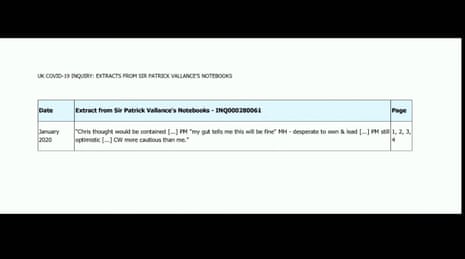
This extract says in February 2020 Whitty was “worried about pulling trigger too soon”.

And in this extract, from February 2021, Vallance says Whitty was “a delayer”.

Asked about Whitty’s stance, Vallance says it is important to remember that, as chief medical officer, Whitty was very aware of the health downsides of a lockdown, for example, from people not getting treatment for other conditions.
Vallance accepts science advisers were ‘wrong’ about when to push for lockdown-type measures at start of pandemic
Back at the Covid inquiry, Andrew O’Connor, counsel for the inquiry, is asking Vallance about the period in February and early March 2020, when the government was working out how to respond to Covid.
O’Connor shows an extract from the witness statement from Ben Warner, a No 10 aide. Warner said the government should have developed plans for a lockdown earlier.
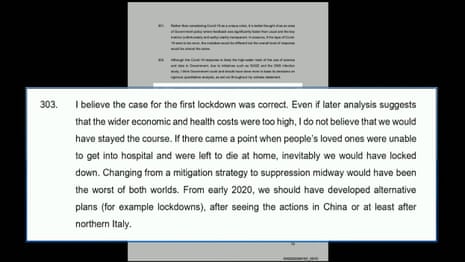
Vallance says the government was not in a position to implement some of the NPIs (non-pharmaceutical interventions – lockdowns, social distancing, masks etc).
Q: Should Sage have been pushing for these measures earlier?
Vallance says the scientists thought these measures would be necessary. But he accepts they were wrong about timing.
Where we were wrong (was) our belief that we understood when to do that.
He says the data coming in on 14 and 15 March showed that Covid was much more advanced than they thought. The NPIs were needed urgently, he says.
He says there had been a data problem.
Here are tweets from journalists on the highlights from the Sunak speech and Q&A.
From ITV’s Robert Peston
The Chancellor will DEFINITELY cut personal income taxes on Wednesday, income tax or national insurance. If he doesn’t the PM will look incredibly foolish for saying this morning, repeatedly, that the moment has come to start cutting taxes, because he knows most voters don’t see the extension of capital allowances for business (though important and expensive) as tax cuts that matter to them. And Rishi Sunak is not a PM who creates expectations if he knows those expectations will be disappointed.
The Chancellor will DEFINITELY cut personal income taxes on Wednesday, income tax or national insurance. If he doesn’t the PM will look incredibly foolish for saying this morning, repeatedly, that the moment has come to start cutting taxes, because he knows most voters don’t see… pic.twitter.com/v4pzDInPs4
— Robert Peston (@Peston) November 20, 2023
From Robert Colvile, a Sunday Times columnist (and head of the Centre for Policy Studies, a Tory thinktank)
Sunak’s speech summarised: because I’ve made you eat your vegetables, I can now give you sweeties. In a judicious and responsible fashion. And Labour would snatch them away again.
— Robert Colvile (@rcolvile) November 20, 2023
From the BBC’s Iain Watson
Rishi Sunak is talking up tax cuts ahead of the autumn statement- he stresses ‘we cant do everything at once’ but ‘we can turn our attention to cutting taxes’ and because inflation has halved, ‘we can begin the next phase and cut tax’
— iain watson (@iainjwatson) November 20, 2023
From my colleague Ben Quinn
Subak is talking up his experience & Jeremy Hunt’s in businesses
“Our political opponents have got no experience whatsoever about running a business”
Cue fresh scrutiny of both men’s records (eg Hunt’s ‘HotCourses’)
— Ben Quinn (@BenQuinn75) November 20, 2023
But he tells us he’s “not a market fundamentalist”
When crisis hit the state has to step in— Ben Quinn (@BenQuinn75) November 20, 2023
This feels a prototype election manifesto, with a lot of likely attack lines that’ll come in a campaign
.. differentiating from Labour on a range of fronts “they will allow unions to bring the country to a standstill with just a third of members support”
— Ben Quinn (@BenQuinn75) November 20, 2023
Sunak seems up for reopening confrontations with Tory low tax ultras like Liz Truss
Says he was willing to resign from govt and lose a leadership election because it’s not possible “to borrow that amount of money” and for it not to have an impact
— Ben Quinn (@BenQuinn75) November 20, 2023
Q: On tax, wouldn’t it make more sense to just lower thresholds – instead of taking with one hand, and giving with the other (by reducing the headline rate).
Sunak says he has taken difficult decisions on tax.
Now, because he has halved inflation, and because the economy has outperformed, he is in a position to look at cutting taxes.
He says, when he became PM, everyone was forecasting a recession for this year.
He says, as he explained in his speech, the government will address tax cuts “seriously and responsibly”. The government will be disciplined, he says. And it will focus on supply side measures.
That is the end of Sunak’s Q&A.
Sunak says the number of small boat crossings have fallen by a third this year.
No one thought that was “remotely possible” when he made the pledge to stop the small boats, he claims.
But he says he is determined to finish the job.
He says he will not let a foreign court stop the UK sending planes to Rwanda.
Sunak says voters will face ‘clear contrast’ at election because Labour’s £28bn borrowing plan means it couldn’t cut taxes
Rishi Sunak has finished his speech, and is now taking questions.
He says Labour would put up borrowing by £28bn a year. That means it would not be able to cut taxes, he says.
He says there will be a “clear contrast” at the election.


